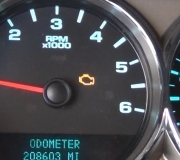Hi and thanks for using 2CarPros.com.
The purge valve allows metered amounts of fumes to enter the engine for burning. If it is stuck open, it could cause an engine vacuum issue. I am going to provide the directions for replacing it if you plan to do so. Pictures 1 and 2 correlate with these directions.
_________________
EVAP PURGE SOLENOID
REMOVAL
Caution: do not allow smoking or the use of open flames in the area where work on the fuel or evap system is taking place. Anytime work is being done on the fuel system, disconnect the negative battery cable, except for those tests where battery voltage is required.
1. Ignition Off.
2. Disconnect purge link quick connect from EVAP purge solenoid.
3. Disconnect EVAP purge solenoid harness connector.
4. Remove purge solenoid and bracket. Remove its ported vacuum line.
INSTALLATION
1. Connect EVAP purge solenoid ported vacuum line.
2. Install EVAP purge solenoid and bracket to cylinder head.
Torque:
EVAP Purge Solenoid Bracket Bolt: 10 N.m (89 in-lbs)
3. Connect purge line quick connect to EVAP purge solenoid. Push in connector until a click is heard, then pull back to confirm positive engagement.
4. Connect EVAP purge solenoid harness connector.
______________________________
Since there was a bad odor behind the vehicle, the catalytic converter may be an issue. Here is a link that shows how to check one as well as one describing symptoms.
https://www.2carpros.com/articles/bad-catalytic-converter-symptoms
https://www.2carpros.com/articles/how-to-test-a-catalytic-converter
_____________________________
Next, an engine vacuum leak can cause the symptoms you described. Here is a link that shows how to check for a vacuum leak.
https://www.2carpros.com/articles/how-to-use-an-engine-vacuum-gauge
______________________________
One last thing. Too much or little fuel pressure can also cause the issue. Here are directions for testing pressure. Make sure the regulator is working properly.
https://www.2carpros.com/articles/how-to-check-fuel-system-pressure-and-regulator
Here are the directions specific to your vehicle. Pics 3 and 4 correlate with these.
FUEL SYSTEM PRESSURE TEST
This test will determine whether there is adequate fuel pressure delivered to the fuel injectors to start and run the engine under low load conditions.
Caution:
do not allow smoking or the use of open flames in the area where work on the fuel or evap system is taking place. Anytime work is being done on the fuel system, disconnect the negative battery cable, except for those tests where battery voltage is required.
Whenever fuel line fittings are loosened or removed, wrap a shop cloth around the fitting and have an approved container available to collect any fuel.
1. Relieve fuel system pressure. (Refer to "Fuel System Pressure Relief".) See: Fuel Pressure Release > Procedures
2. Connect fuel gauge pressure adapter (309725) and pressure gauge to fuel pressure test port.
IMPORTANT: Battery must be at a minimum of 12 volts when performing any fuel system test. Charge battery before proceeding if below 12 volts.
3. Using Scan Tool, energize the fuel pump for a minimum of 10 seconds.
3.1 Record the fuel pressure.
3.2 Repeat this procedure a minimum of two times.
4. While fuel pump is energized remove fuel pressure regulator vacuum line and inspect both ends for liquid fuel.
If liquid fuel is present replace fuel pressure regulator before proceeding. (Refer to "Fuel Pressure Regulator Removal" procedure.)
If no liquid is present proceed to step 5.
5. Compare the pressure recorded to the published specification.
6. Return to "Fuel System Diagnostic Chart" and use test result to make appropriate decision.
______________________
Before I sign off, here is one last link I wanted to provide. It discusses common reasons for a backfire. Take a look through it to see if anything mentioned mirrors what you are experiencing.
https://www.2carpros.com/articles/engine-backfires-while-running
I hope something here helps. Let me know if you have other questions.
Take care,
Joe
Images (Click to make bigger)
Sunday, November 11th, 2018 AT 8:06 PM






